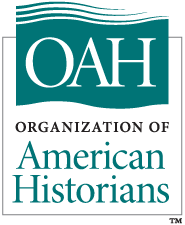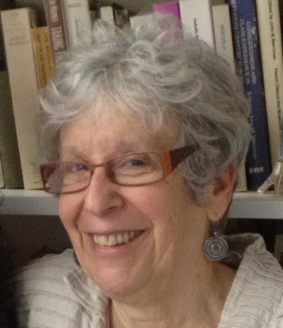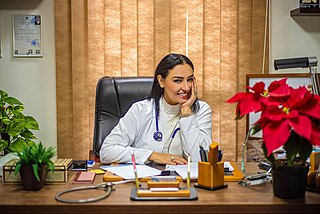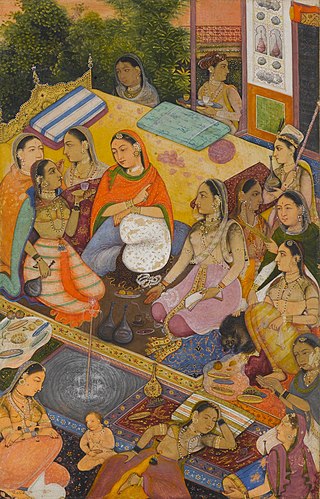Related Research Articles

Quaker views on women have always been considered progressive in their own time, and in the late 19th century this tendency bore fruit in the prominence of Quaker women in the American women's rights movement.
The Society for Historians of American Foreign Relations (SHAFR) was founded in order to "promote excellence in research and teaching of American foreign relations history and to facilitate professional collaboration among scholars and students in this field around the world." It hosts an annual conference, and publishes the quarterly Diplomatic History. It also publishes a triennial newsletter, Passport. SHAFR has increasingly fostered connections with international historians and organizations.

The Organization of American Historians (OAH), formerly known as the Mississippi Valley Historical Association, is the largest professional society dedicated to the teaching and study of American history. OAH's members in the U.S. and abroad include college and university professors; historians, students; precollegiate teachers; archivists, museum curators, and other public historians; and a variety of scholars employed in government and the private sector. The OAH publishes the Journal of American History. Among its various programs, OAH conducts an annual conference each spring, and has a robust speaker bureau—the OAH Distinguished Lectureship Program.

The presence of women in science spans the earliest times of the history of science wherein they have made significant contributions. Historians with an interest in gender and science have researched the scientific endeavors and accomplishments of women, the barriers they have faced, and the strategies implemented to have their work peer-reviewed and accepted in major scientific journals and other publications. The historical, critical, and sociological study of these issues has become an academic discipline in its own right.

Joan Wallach Scott is an American historian of France with contributions in gender history. She is a professor emerita in the School of Social Science in the Institute for Advanced Study in Princeton, New Jersey. Scott is known for her work in feminist history and gender theory, engaging post-structural theory on these topics. Geographically, her work focuses primarily on France, and thematically she deals with how power works, the relation between language and experience, and the role and practice of historians. Her work grapples with theory's application to historical and current events, focusing on how terms are defined and how positions and identities are articulated.
Glenda Elizabeth Gilmore is an American historian of the American South at Yale University. She is the author of many publications, including "These United States: A Nation in the Making 1890 to Present" (2015), "Gender and Jim Crow: Women and the Politics of White Supremacy in North Carolina, 1896-1920" (1996), and "Defying Dixie: The Radical Roots of Civil Rights, 1919-1950" (2008).
Mary Beth Norton is an American historian, specializing in American colonial history and well known for her work on women's history and the Salem witch trials. She is the Mary Donlon Alger Professor Emeritus of American History at the Department of History at Cornell University. Norton served as president of the American Historical Association in 2018. She is a recipient of the Ambassador Book Award in American Studies for In the Devil's Snare: The Salem Witchcraft Crisis of 1692. Norton received her Bachelor of Arts at the University of Michigan (1964). The next year she completed a Master of Arts, going on to receive her Ph.D. in 1969 at Harvard University. She identifies as a Democrat and she considers herself a Methodist. Mary Beth Norton is a pioneer of women historians not only in the United States but also in the whole world, as she was the first woman to get a job in the department of history at Cornell University.

Gerda Hedwig Lerner was an Austrian-born American historian and woman's history author. In addition to her numerous scholarly publications, she wrote poetry, fiction, theatre pieces, screenplays, and an autobiography. She served as president of the Organization of American Historians from 1980 to 1981. In 1980, she was appointed Robinson Edwards Professor of History at the University of Wisconsin-Madison, where she taught until retiring in 1991.

Susan Solomon is an American atmospheric chemist, working for most of her career at the National Oceanic and Atmospheric Administration (NOAA). In 2011, Solomon joined the faculty at the Massachusetts Institute of Technology, where she serves as the Ellen Swallow Richards Professor of Atmospheric Chemistry & Climate Science. Solomon, with her colleagues, was the first to propose the chlorofluorocarbon free radical reaction mechanism that is the cause of the Antarctic ozone hole. Her most recent book, Solvable: how we healed the earth, and how we can do it again (2024) focuses on solutions to current problems, as do books by data scientist Hannah Ritchie, marine biologist, Ayana Elizabeth Johnson and climate scientist Katharine Hayhoe.

The presence of women in medicine, particularly in the practicing fields of surgery and as physicians, has been traced to the earliest of history. Women have historically had lower participation levels in medical fields compared to men with occupancy rates varying by race, socioeconomic status, and geography.

Women's history is the study of the role that women have played in history and the methods required to do so. It includes the study of the history of the growth of woman's rights throughout recorded history, personal achievements over a period of time, the examination of individual and groups of women of historical significance, and the effect that historical events have had on women. Inherent in the study of women's history is the belief that more traditional recordings of history have minimised or ignored the contributions of women to different fields and the effect that historical events had on women as a whole; in this respect, women's history is often a form of historical revisionism, seeking to challenge or expand the traditional historical consensus.

Women in architecture have been documented for many centuries, as professional practitioners, educators and clients. Since architecture became organized as a profession in 1857, the number of women in architecture has been low. At the end of the 19th century, starting in Finland, certain schools of architecture in Europe began to admit women to their programmes of study. In 1980 M. Rosaria Piomelli, born in Italy, became the first woman to hold a deanship of any school of architecture in the United States, as Dean of the City College of New York School of Architecture. In recent years, women have begun to achieve wider recognition within the profession, however, the percentage receiving awards for their work remains low. As of 2023, 11.5% of Pritzker Prize Laureates have been female.
Jennifer Guglielmo is a writer, historian and associate professor at Smith College, specializing in the histories of labor, race, women, im/migration, transnational cultures and activisms, and revolutionary social movements in the modern United States. She has published on a range of topics, including women’s organizing in garment, textile and domestic work, working-class feminisms, anarchism, whiteness and the Italian diaspora.
The Southern Association for Women Historians (SAWH) is a professional organization in the United States founded in 1970. It supports the study of women's and gender history of the American South, gives annual book and article prizes, and provides networking opportunities for its members, especially at its triennial conference.
Monica H. Green is an author and a historian who was a professor of history at Arizona State University. She is an expert in the history of women's health care in premodern Europe, medicine and gender, and she specialises in the history of infectious diseases in the pre-modern period.
Patricia Anne Gabow is an American academic physician, medical researcher, healthcare executive, author and lecturer. Specializing in nephrology, she joined the department of medicine, division of renal diseases, at the University of Colorado School of Medicine in 1973, advancing to a full professorship in 1987; she is presently Professor Emerita. She was the principal investigator on the National Institutes of Health Human Polycystic Kidney Disease research grant, which ran from 1985 to 1999, and defined the clinical manifestations and genetics of the disease in adults and children.
Susan Broomhall is an Australian historian and academic. She is an Australian Research Council Future Fellow and Professor of History at The University of Western Australia, and from 2018 Co-Director of the ARC Centre of Excellence for the History of Emotions (CHE). She was a Foundation Chief Investigator (CI) in the 'Shaping the Modern' Program of the Centre, before commencing her Australian Research Council Future Fellowship within CHE in October 2014, and the Acting Director in 2011. She is a specialist in gender history and the history of emotions.
Stephanie E. Jones-Rogers is an American historian. She is an associate professor of history at the University of California, Berkeley, and the author of They Were Her Property: White Women as Slave Owners in the American South. She is an expert in African-American history, the history of American slavery, and women's and gender history.
Catherine Allgor is an American historian focusing on women and early American history; she has written and lectured extensively on Dolley Madison and the founding generation of American women. Since 2017 she has served as the president of the Massachusetts Historical Society. Previously Allgor was appointed to the James Madison Memorial Fellowship Foundation by President Barack Obama and has served as the Nadine and Robert A. Skotheim Director of Education at the Huntington Library in San Marino, California. Formerly she was a Professor of History and UC Presidential Chair at the University of California, Riverside, and has taught at Claremont McKenna College, Harvard University, and Simmons University. Allgor was a Frances Perkins Scholar at Mount Holyoke College and received her PhD from Yale University where she was awarded the Yale Teaching Award. Her dissertation was awarded best dissertation in American history at Yale and received the Lerner-Scott Prize for the Best Dissertation in U.S. Women's History.
Susan Cayleff is an American academic and emeritus professor at San Diego State University, having taught there from 1987 to 2020. She was one the inaugural members of the National Women's Studies Association Lesbian Caucus and served on the organization's Coordinating Council between 1977 and 1979. She founded the Women's History Seminar Series at the University of Texas Medical Branch, in Galveston, Texas; the Graduate Women's Scholars of Southern California in 1989; and was a co-founder of the SafeZones program at San Diego State University.
References
- ↑ "Susan Hanket Brandt". University of Colorado, Colorado Springs. Retrieved February 9, 2023.
- ↑ "Lerner-Scott Prize Winners". Organization of American Historians . Retrieved February 9, 2023.
- ↑ Breslaw, Elaine G. (2023). "Susan H. Brandt, Women Healers: Gender, Authority, and Medicine in Early Philadelphia" . Social History of Medicine . doi:10.1093/shm/hkac058.
- ↑ "Susan H. Brandt, interview". Perspectives. Consortium for History of Science, Technology and Medicine. August 10, 2022. Retrieved February 9, 2023.